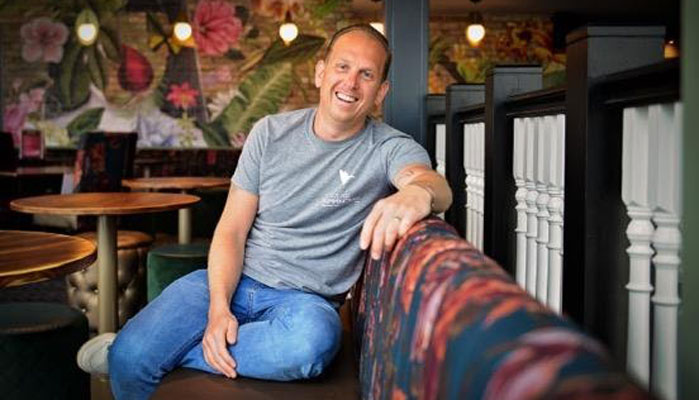Virtual mental health first aid and suicide prevention training launches ahead of Mental Health Awareness Day, 10th October

As a second national lockdown is imminent, and social distancing rules continue, mental health and suicide prevention non-profit We are Hummingbird has announced a new series of virtual and socially distanced in–person training sessions designed to help businesses identify employees suffering at this time of uncertainty.
Having experienced first hand the challenges posed by mental illness in today’s fast-paced, results-driven work environment, Ian Hurst, co-founder of We are Hummingbird is an advocate of watching out for our colleagues, co-workers and teammates. He says “Now more than ever, there is a need to be able to identify the signs of when someone is experiencing poor mental health and take what are often simple steps to assist them. Many of us are experiencing extremely stressful and challenging times and coupled with financial insecurity, feelings of loneliness from working in isolation at home, and disconnection from our colleagues, friends and family - it creates the perfect storm. For some, this period of heightened anxiety may trigger profound feelings of despair and perhaps even lead to thoughts of suicide.”
Hurst continues “distressingly, on average everyday 12 men and 4 women will complete suicide in the UK and the impact on families is heart-breaking. The latest figures from the Samaritans sadly show there are 6,507 suicides in the UK a year with the highest rate among men aged 45-49.”
Unchecked mental health also impacts the wider economy, analysis by Deloitte, finds that poor mental health costs UK employers up to £45 billion each year. This is a rise of 16 per cent since 2016 - an extra £6 billion a year. While the Centre of Mental Health has found a staggering 70 million workdays are lost each year due to mental health problems in the UK.
Deloitte research also found that for every £1 spent by employers on mental health interventions they get £5 back in reduced absence, presenteeism and staff turnover. Showing you really can't afford not to invest in training and education.
Hurst’s mental health first aid and suicide prevention and intervention training aims to remove the clinical jargon and help to educate as many people as possible in mental health first aid. “It is now a recommendation to have a mental health first aider in every workplace. Employers need to treat mental health in the same way as physical health” explains Ian.
Hurst’s previous training clients have included Deliveroo, The Royal Navy, Great Western Railway, DPD, Novatech, and Axa Insurance just to name a few. Here are his five essential behaviours to watch out for in others:
1.Changes in personality and/ or appearance over a prolonged period of time – a person experiencing poor mental health may become less concerned about their personal appearance and often exhibit a change in attitude or behaviour.
2. Expressing verbal or non verbal signs of not continuing with life, around 95% of people planning their suicide will give off signs that they have or are considering ending their life. It is up to us to recognise the warning sign and allow them full permission to speak.
3. Changes in life circumstances such as job loss, break up of relationship or bereavement these life events whilst often not the driving force alone of suicide, can be an impetus to act for indviduals with suicidal thoughts.
4. Getting things in order such as suddenly paying back money, going out of their way to see old friends, giving away personal possessions and cleaning up their home are possible signs that a person is making preparations and likely has a suicide plan.
5. Suddenly calmness after a period of poor mental health such as depression, a sharp change of outlook or elation is a sign that the person has made a decision to end their life.
“Sudden calmness or even euphoria are the most misunderstood element of suicide behaviour” explains Hurst. He adds “often we hear shock and surprise from loved ones who have lost someone to suicide, saying “we thought they had got better, they seemed more themselves lately. However, this is often the final element of what is known as the sucicide continuum.
“We all feel a sense of relief when someone we care about suddenly “feels better”, we assume that all is well and good, however, often this can be due to the individual being at peace with their decision. We must stop looking for a “fix”, and accept that change and recovery is an ongoing process and not something that happens overnight.”
If you believe someone you know is in immediate danger of suicide do not leave the person alone. People who receive support from friends and family are less likely to act on their suicidal plans.
We are Hummingbird offers Mental Health First Aid Training and Suicide Prevention and Intervention training tailored to businesses and industries. Visit www.wearehummingbird.com and go to the ‘We are Hummingbird Health’ section.
Add your comment

- Administration 1
- Building Design, Planning, Development 1
- Catering 2
- Construction 4
- Contracts, Projects, Bids 2
- Energy Management 1
- Engineering, Maintenance 16
- Estates, Property 5
- Facilities Management (main) 20
- Hard Services 12
- Health & Safety 1
- Management 5
- M&E 3
- Operations 6
- Sales & Marketing 3
- Soft Services 5
- Sustainability 1
- ICT, Technical 5
- Workplace 2


